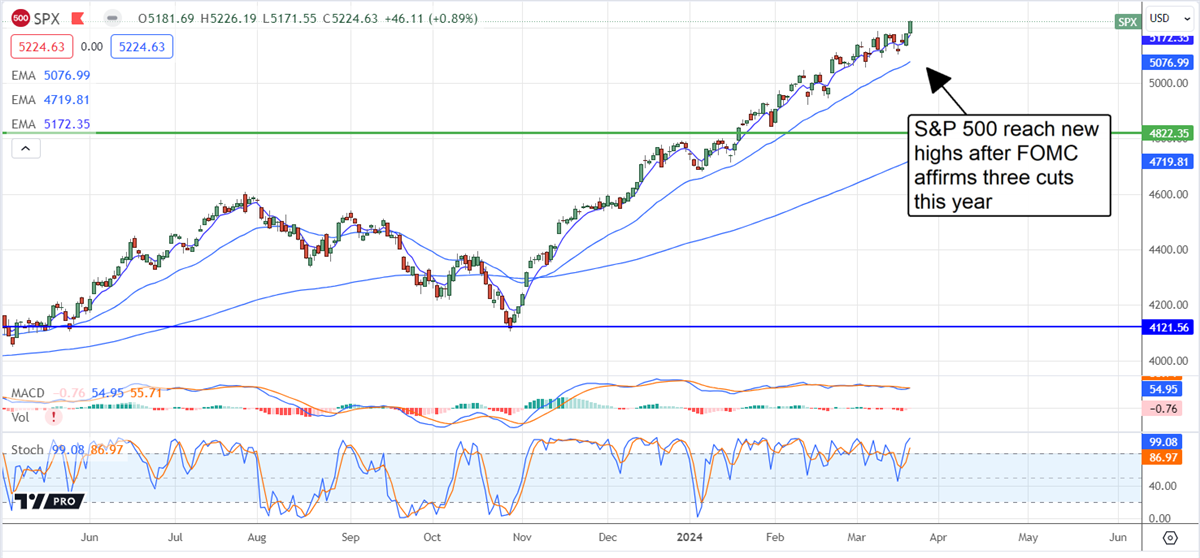The FOMC news was good for the market despite failing to indicate when the first interest rate cut would come. While the timing of reductions is questionable, the Fed reaffirmed an outlook for three twenty-five basis point cuts this year, three for next, and three for 2026, eventually bringing the target rate to neutral soon after. The takeaway is that the U.S. economy is on the cusp of an economic pivot that will unfetter activity, boosting revenue and earnings for S&P 500 NYSEARCA: SPY companies. That is why the market is in rally mode, but there are risks.
An Improving Growth Outlook Sends the S&P 500 to New Highs
The S&P 500 rallied to new highs because the growth outlook is improving across sectors. Numerous analysts' revisions were released within the first 18 hours of the FOMC statement, upping the 2024 GDP target by 70bps to 2.1%. The FOMC also upped its labor market assessment, calling it strong compared to moderate in the previous statement.
The risk for markets is that inflation will persist at above-normal levels through mid-year, altering the FOMC’s policy stance. Consumer and government spending will support economic growth and sustain a higher inflation level for longer. Fed Chief Jerome Powell made it clear the committee would keep rates higher "for longer, if appropriate" if the data doesn't cooperate. As it stands now, the data is highly questionable.
The latest CPI index showed inflation accelerating from the previous month at the headline and core levels, with YOY inflation accelerating at the headline and the core hotter than expected. The next read of the PCE Price Index is a week away and likely to confirm that news. This puts the Fed in a challenging position regarding cuts: the labor mandate is met and inflation is still hot. Economists also raised their targets for PCE in 2024, upping consensus by 20 bps to 2.6%.
Peak Rates Are Here, But Lower Rates May Not Come as Soon as Expected
The FOMC says it will cut rates three times this year, but it is quickly running out of time. There are only six meetings left this year, and with no cut expected before summer, only a few meetings are left for them to follow through on their intent. As it is, the timing of the first cut continues to move back, and will likely move further out as the spring progresses, due to housing markets, resilient consumer spending and oil prices.
The housing market remains sluggish, but business conditions are sufficient to sustain higher housing prices. Shelter was a primary driver of increased CPI in February, up 0.4% for the month and 5.7% YOY, with no reductions expected. An interest rate cut would be counterproductive for the Fed because it would empower the housing market.
Gasoline was also a significant driver of inflation, and the impact may grow. Gasoline prices are down compared to last year but showed the hottest month-to-month gain of any component, up 3.8%. The cause? Rising oil prices, which are up 17% from the December lows and heading higher on consumption and geopolitical risk. Cutting rates too soon would boost energy demand and oil prices, underpinning inflation.
And the consumer? Retail sales were slightly below consensus for February, but solid at up 0.6%. No sign of recession there, and the forecasts for the year are rising. Economists at the National Retail Federation have lifted the target range to 2.5% to 3.5%, compared to 2023's 2.6%.
Is The S&P 500 Rallying Toward a Hard Ceiling?
The S&P 500 is in rally mode and may continue to rally through late spring or early summer. The risk is that inflationary data will not cooperate, leading the FOMC to push back the timing of cuts once more. In this scenario, there would not be three cuts this year without an economic recession, and a recession seems unlikely.
Because the market is pricing in a significant acceleration of earnings power for the S&P 500 for the back half, predicated on interest rate reductions, higher-for-longer will cut into the outlook and undercut the market's valuation. The index is trading well above its long-term average P/E ratios, the 30-day EMA, the 150-day EMA and any technical target that can be called strong. It is set up for a deep correction when the correction comes; so, yes, the S&P is rallying toward a potentially hard ceiling and may reach it by late spring.

Before you consider SPDR S&P 500 ETF Trust, you'll want to hear this.
MarketBeat keeps track of Wall Street's top-rated and best performing research analysts and the stocks they recommend to their clients on a daily basis. MarketBeat has identified the five stocks that top analysts are quietly whispering to their clients to buy now before the broader market catches on... and SPDR S&P 500 ETF Trust wasn't on the list.
While SPDR S&P 500 ETF Trust currently has a Hold rating among analysts, top-rated analysts believe these five stocks are better buys.
View The Five Stocks Here
Enter your email address and we'll send you MarketBeat's list of seven best retirement stocks and why they should be in your portfolio.
Get This Free Report
Like this article? Share it with a colleague.
Link copied to clipboard.